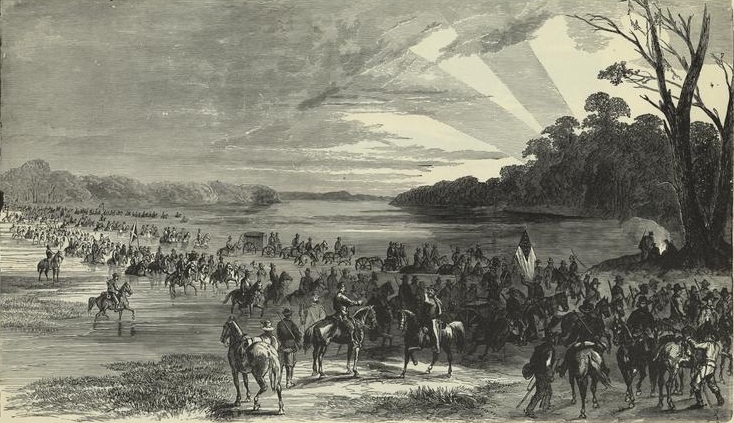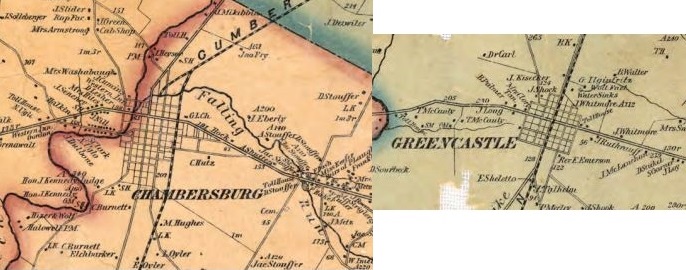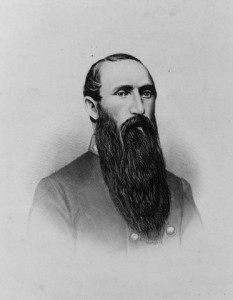“Our News is Cut Off and We Are Under Rebel Rule”
Posted By Jake Wynn on June 16, 2013
The total collapse of Union forces at Winchester on June 15 sent hundreds of stragglers careening through southern Pennsylvania en route to Harrisburg via the Cumberland Valley. Their wagon train, numbering nearly 500 fully loaded wagons, sped through the southern towns at breakneck speed, saying the Southerners were fast on their heels.
As June 16, 1863 dawned, the situation enveloping Central Pennsylvania continued to become more perilous. A party of rebel cavalry numbering in the hundreds had occupied the Pennsylvania border towns of Greencastle and Chambersburg the previous evening.
Late in the evening of the 15th, Southern cavalry under the command of Albert Jenkins briefly occupied Chambersburg, stationing themselves on a farm just outside the town limits.
Amos Stouffer, the young man from Chambersburg recorded this in his diary on June 16.
“The Rebs are in town. The great body have followed Milroy’s wagon trains which went through town yesterday. About 500 wagons and 2,000 horses-a very valuable train. The rebs are mannerly yet and do not disturb private property. They have their pickets all around us. Our news is cut off and we are under rebel rule. “
These Pennsylvania towns must have seemed very lonely to its remaining citizens. According to a telegram sent by Governor Andrew Curtin, the telegraph officer in Chambersburg had been forced to evacuate to nearby Scotland Bridge, nine miles from Chambersburg. This had effectively cut off Chambersburg and nearby communities from the rest of the North.
Rachel Cormany, also of Chambersburg, recorded the rebels entering the town early in the morning on June 16. She reported an incident at about 2:30 in the morning involving Confederate pickets. According to Cormany, the Confederate cavalry clattered through the main street, when a single shot was fired at them from somewhere within the town. She wrote that the “greybacks” threatened to burn the town if fired upon again. Following the flare-up, the town sank back into an uneasy sleep until the morning. Then Cormany reports the most hair-raising of tales.
“We almost came to the conclusion that the reb’s had left again leaving only a small guard who took things quite leasurely. Soon however they became more active. Were hunting up the contrabands & driving them off by droves. O! How it grated on our hearts to have to sit quietly & look at such brutal deeds–I saw no men among the contrabands–all women & children. Some of the colored people who were raised here were taken along–I sat on the front step as they were driven by just like we would drive cattle.”
What she is describing is one of the most somber and often forgotten chapters of the Gettysburg Campaign. Rebel soldiers looked not only for food, drink, and horses, but actively sought out “contrabands” or African-Americans in the areas they occupied. Escaped slaves mixed with free black citizens of Pennsylvania as they fled the coming rebel invasion. Sadly, several of them were caught up in the rebel advance, and where forcibly marched south into slavery.
The rounding up of contrabands and a few cases of arson, along with the theft of horses, was the result of this first Confederate advance into Pennsylvania that summer. However, this tipped the hand of the Southern forces. Suddenly, leaders in the state capital realized that the Keystone State and their city was the real target of the Southern advance.
Tomorrow’s topic will be the first responses to Confederates entering Pennsylvania.
Diaries for this post came from the Valley of the Shadow Collection by the University of Virginia.
Pictures also come from the Library of Congress Collection of Civil War Images
Stay tuned for more posts as Central Pennsylvania commemorates the 150th anniversary of the Invasion of Pennsylvania and the battle of Gettysburg.
 ;
;






Comments